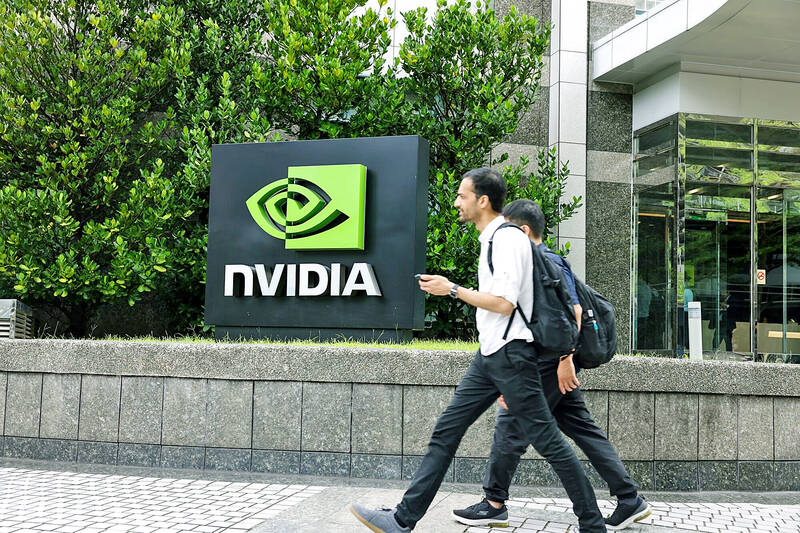Taiwan Semiconductor Manufacturing Co (TSMC, 台積電) shares yesterday rallied 2 percent on the local stock market after Nvidia Corp said the contract chipmaker would be the sole supplier of its latest graphics processing chip, defusing speculation that Intel Corp would get a share of the orders.
TSMC’s share price climbed to NT$562, snapping a three-day losing streak. It outperformed the benchmark index’s 1.18 percent gain. Net purchases by foreign institutional investors yesterday totaled 8.37 million shares, reversing net sales of 2.9 million shares on Thursday.
The rebound follows Nvidia’s announcement that its latest artificial intelligence graphics processing unit (GPU), codenamed H100, would be made using the Taiwanese firm’s 4-nanometer process technology, extending its partnership with the world’s biggest contract chipmaker.

Photo: Cheng I-hwa, Bloomberg
“Our next-generation [GPU] gonna be made at TSMC,” Nvidia founder and chief executive offer Jensen Huang (黃仁勳) told reporters on Thursday in Taipei after appearing on the stage with server maker Super Micro Computer Inc’s chief executive Charles Liang (梁見後) at Computex Taipei.
“We are diversifying through multiple nodes and multiple fabs at TSMC. We are also going to diversify in the US at TSMC. So TSMC is now part of Nvidia’s diversity and redundancy strategy,” Huang said. “It will take some time to target designs for the US fab.”
TSMC’s new US fab in Arizona is to commence mass production of 4-nanometer chips by the end of next year.
The Hsinchu-based chipmaker is planning a second fab in the US to make 3-nanometer chips. Together, the two fabs would have an installed capacity of 600,000 12-inch wafers, it said.
Huang said TSMC is a company with “immense capacity” and “incredible agility.”
Besides, TSMC is running its local fabs at a high yield rate and delivers very good costs, Huang said.
The demand for Nvidia’s H100 AI GPU processor “is extremely high,” he added.
Huang dismissed a media report that Nvidia could make its H100 GPU processor at Intel. TSMC is also the supplier of Nvidia’s previous generations of GPU, including the A100 and A800 series, using TSMC’s 7-nanometer process technology.
“That’s not true,” Huang said. “TSMC’s process technology is, as you know, world class.”
Huang on Wednesday said Nvidia adopted a diversity and redundancy strategy to safeguard the resilience of its supply chain.
The company also works with Samsung Electronics Co and is open to cooperating with Intel on manufacturing, he said.

When Lika Megreladze was a child, life in her native western Georgian region of Guria revolved around tea. Her mother worked for decades as a scientist at the Soviet Union’s Institute of Tea and Subtropical Crops in the village of Anaseuli, Georgia, perfecting cultivation methods for a Georgian tea industry that supplied the bulk of the vast communist state’s brews. “When I was a child, this was only my mum’s workplace. Only later I realized that it was something big,” she said. Now, the institute lies abandoned. Yellowed papers are strewn around its decaying corridors, and a statue of Soviet founder Vladimir Lenin

UNIFYING OPPOSITION: Numerous companies have registered complaints over the potential levies, bringing together rival automakers in voicing their reservations US President Donald Trump is readying plans for industry-specific tariffs to kick in alongside his country-by-country duties in two weeks, ramping up his push to reshape the US’ standing in the global trading system by penalizing purchases from abroad. Administration officials could release details of Trump’s planned 50 percent duty on copper in the days before they are set to take effect on Friday next week, a person familiar with the matter said. That is the same date Trump’s “reciprocal” levies on products from more than 100 nations are slated to begin. Trump on Tuesday said that he is likely to impose tariffs

HELPING HAND: Approving the sale of H20s could give China the edge it needs to capture market share and become the global standard, a US representative said The US President Donald Trump administration’s decision allowing Nvidia Corp to resume shipments of its H20 artificial intelligence (AI) chips to China risks bolstering Beijing’s military capabilities and expanding its capacity to compete with the US, the head of the US House Select Committee on Strategic Competition Between the United States and the Chinese Communist Party said. “The H20, which is a cost-effective and powerful AI inference chip, far surpasses China’s indigenous capability and would therefore provide a substantial increase to China’s AI development,” committee chairman John Moolenaar, a Michigan Republican, said on Friday in a letter to US Secretary of

Taiwan Semiconductor Manufacturing Co’s (TSMC, 台積電) market value closed above US$1 trillion for the first time in Taipei last week, with a raised sales forecast driven by robust artificial intelligence (AI) demand. TSMC saw its Taiwanese shares climb to a record high on Friday, a near 50 percent rise from an April low. That has made it the first Asian stock worth more than US$1 trillion, since PetroChina Co (中國石油天然氣) briefly reached the milestone in 2007. As investors turned calm after their aggressive buying on Friday, amid optimism over the chipmaker’s business outlook, TSMC lost 0.43 percent to close at NT$1,150